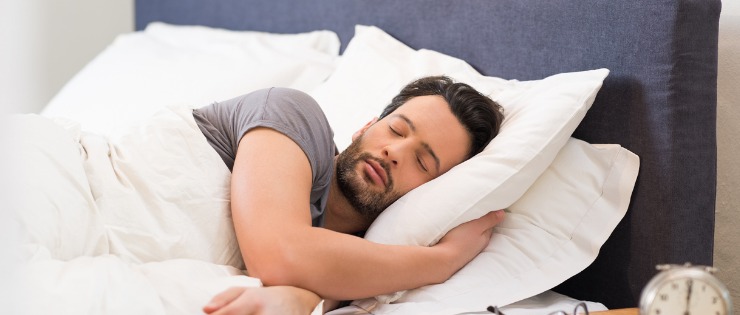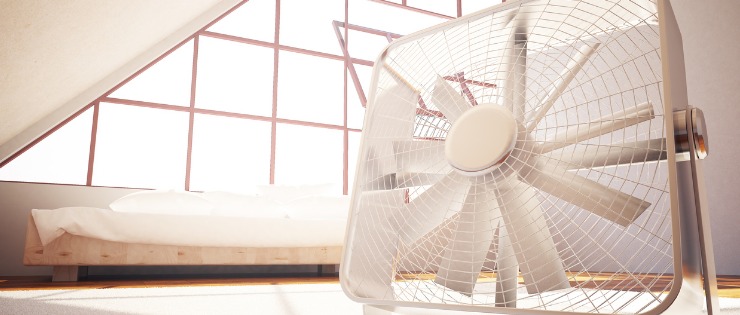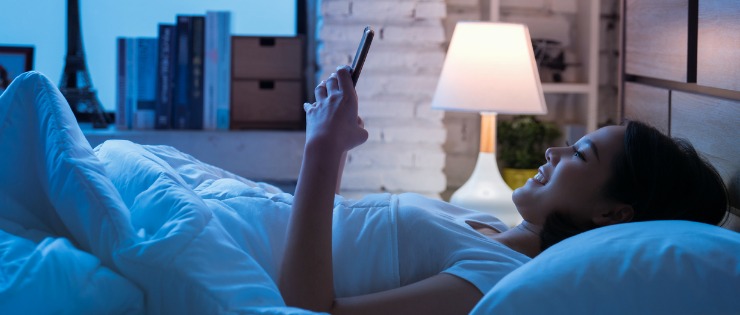
Without enough sleep, our health and wellbeing suffers. Sleep is required for the human body to rejuvenate, repair tissue, grow muscle, restore the immune system and balance hormones. Our brain needs sleep to process the day’s events into long-term memory.
The recommended amount of sleep for adults is 7 to 9 hours every night. Any less and you can be doing yourself physical and mental harm. Poor sleep quality has been linked to psychological problems including anxiety, depression and suicidal thoughts.
So, how do we sleep better, deeper and faster? First we need to understand how sleep works:
The Stages of Sleep
Sleep occurs in five stages. Each stage of sleep lasts for 5 and 15 minutes and a complete sleep cycle takes 90 to 110 minutes.
Stage 1 – light sleep where the eyes move slowly and muscle activity slows down . Some people experience muscle contractions then a feeling of falling. You are easily awakened during this stage.
Stage 2 – the body temperature drops and heart rate slows. There is an occasional burst of rapid brain waves but the waves have slowed and eye movement has stopped as the body prepares for deep sleep.
Stage 3 – now in deep sleep, the brain waves are extremely slow and interspersed with smaller, faster waves (delta waves).
Stage 4 – still in deep sleep, the brain is producing delta waves.
REM – intense dream and brain wave activity occurs during this stage. While the eyes are still closed, they are moving quickly from side to side. Breathing is rapid and shallow. The heart rate increases and blood pressure rises.
After REM sleep, stage one begins again and the cycle occurs four to five times per night, depending on the hours a person stays asleep.
The length of time spent in each stage of sleep depends on age. A sleeping baby spends almost 50% of their time in REM while an adult spends almost 50% in stage 2 and only 20% in REM. It’s thought that REM sleep is linked to learning and memory. Children are learning more than adults during the day so they need more time in REM to process all that learning.
How to Sleep at Night Naturally
We have put together a list of nine practical ways you can sleep better at night naturally:
1. Get Enough Exercise During Day
Exercise can improve the quality and quantity of your sleep. Physical activity during the day can increase the amount of time you spend in a deep sleep at night. The restorative sleep boosts immune function, controls stress and anxiety and supports cardiac health.
The length of your sleep can increase if you have been active during the day to expend your energy, so you feel tired at night. But don’t expect to see results straight away. It can take time for the benefits of exercise take effect.
A study of a small group of people in their 60s who had insomnia took part in an exercise study. It took four months for their insomnia to improve. The group was doing 3-4 sessions of 30 minutes of exercise each week mainly on a stationary bike. Their sleep diaries showed they were sleeping about 45 minutes to one hour more each night and were waking up feeling less sleepy. It was thought that it takes a long time for the exercise to affect because they have hyper-arousal of their stress system which takes time to turn around.

Exercise can improve restless leg syndrome which causes parts of the body to move voluntarily, itch or burn at night. Symptoms of the syndrome usually occur at night, disturbing the sufferer's sleep. If exercise can reduce the attacks, sleep won’t be interrupted as often.
2. Try These Natural Supplements to Improve Sleep
Rather than reaching for sleeping pills, many people use natural supplements to help them get a good night’s sleep. Popular remedies include:
Magnesium
Increasing your intake can improve the quality and quantity of sleep due to its relaxing effects and regulation of melatonin levels. It’s also thought magnesium may increase brain levels of gamma-aminobutyric acid (GABA) which is a brain messenger with calming effects.
Lavender
One of the most popular sleep inducing supplements, some people claim that just smelling lavender oil for 30 minutes before bed can improve the quality of sleep. Lavender supplements can also be ingested however some people experience side effects of nausea and stomach pain.
Melatonin
Many research studies have been conducted into the positive effect of melatonin on jet lag and sleep for shift workers. Our bodies produce melatonin to signal the brain it’s time to sleep. Levels of melatonin rise when it’s dark outside and fall when it’s light. Melatonin supplements can reduce the time it takes for people with sleep disorders to fall asleep and increase the time they stay asleep.
3. Set Up Your Sleeping Environment For a Restful Night’s Sleep
It’s no surprise that we feel tired during heat waves - the temperature of your room plays a big part in how well you sleep. Ideally, your room should be between 18-22 degrees celsius, so on a hot summer’s night you may need a fan or air conditioner. Dress yourself (and your bed) in clothes that suit the season, so you don’t overheat and wake during the night.
Noises can be distracting when you are falling asleep. Try to eliminate noises or mask them with a sound machine that produces mellow sounds that help you relax. White noise from a fan or dedicated white noise machine can dampen other sounds and help you stay asleep longer through the night.

Your bed should be comfortable. Buy a mattress that is the right firmness, suits your sleeping position, and minimises partner disturbance. Choose bedding materials that aren’t going to itch or exacerbate any allergies.
What’s in your bedroom can have a significant impact on your sleep hygiene too. Sure you might not be able to see your work desk and computer when the light is out but you know it’s there when you’re trying to fall asleep. Try to avoid working on a laptop or tablet in bed or right before bed.
4. Mind Over Matter
The mind is powerful and can stop you from falling asleep if you are worried about something. If you find yourself thinking about tomorrow’s activities or concerns, get up out and bed and go to another room. Worrying in bed can quickly become a bad habit that’s difficult to break. Don’t allow your brain to associate bed with worry time. Only return from the other room once you have put aside your concerns and feeling sleepy.
There is nothing worse than having trouble falling asleep and worrying you need to get up for work in a few short hours. If you are tempted to clock watch, place your clock somewhere you can’t see the time.
Try not to feel anxious and instead think happy thoughts while you try to fall asleep. See tip number seven for breathing techniques to ease the worries and racing thoughts.
5. Take a Warm Bath or Shower
Enjoying a warm bath or shower before bed is a good way to get to sleep quickly and enjoy better quality sleep. Warm water raises your body temperature which then drops after you get out of the shower. This drop in temperature indicates to the body's circadian rhythm that it’s time to sleep. Your heart rate, breathing and digestion slow down, ready for rest. Optimal sleep conditions aren’t instant though. A relaxing bath is also a good way to wind down from the day’s stresses and get yourself in a relaxed mood for a restful night’s sleep.
6. Eat These Foods for Good Sleep
Foods high in tryptophan, magnesium, calcium, and B6 – can induce sleep more than others.
Tryptophan
The amino acid Tryptophan increases the sleep-inducing hormone, melatonin.
Foods containing tryptophan include:
turkey
nuts and seeds
red meat
cheese
chicken and turkey
Magnesium
The mineral magnesium can improve the sleep quality especially for people with insomnia. It is thought magnesium reduces inflammation and reduces the stress hormone cortisol.
Good sources of magnesium include:
almonds
bananas
nuts and seeds
legumes
seafood
Calcium
A lack of calcium can make it hard to fall asleep, and cause you to wake soon after falling asleep. Research has shown low calcium levels are linked with poor REM sleep.
Foods high in calcium include:
dairy
green leafy vegetables
salmon
sardines
Vitamin B6
Deficiencies in vitamin B6 can induce sleep problems. But before you take a big dose of B6, it’s important to know your stores are low otherwise you can make your insomnia worse. Consult your doctor before self-medicating.
Vitamin V6 can be found in:
pork
chicken and turkey
fish
bread
eggs
7. Use Breathing Techniques to Fall Asleep in 5 Minutes
Deep breathing and meditation can help you fall to sleep quickly and stay asleep. Breathing works by calming your nervous system.
4-7-8 Breathing Method – designed to relax the nervous system, follow these steps to restful sleep.
1. Place the tip of your tongue behind your teeth
2. Exhale completely making a whooshing sound
3. Close your mouth and inhale through your nose for a count of four
4. Hold your breath and count for seven in your head
5. Open your mouth and exhale completely counting to eight in your head and making a whooshing sound
6. Repeat the cycle at least three more times
8. Remove Blue Light to Fix Your Sleeping Pattern
Find yourself lying awake hours after going to bed still using your phone or looking at the TV? Watching a TV, laptop or phone screen before turning in for the night increases your exposure to blue light. This fools your body's circadian rhythm into thinking it’s day time - keeping you wide awake and increasingly anxious about your lack of sleep.

Leave all electronic devices out of your bedroom completely so you aren’t tempted to look at the screen and the blue light they emit. Instead use soft warm lighting from a bedside lamp to wind down and get your sleeping pattern on the right track. Reading a book instead of looking at your phone could have you falling asleep faster and sleeping more soundly.
9. Read or Write to Relax
Rather than watching TV to wind down just before bed, try reading or writing instead. You are more likely to feel calm and restful from spending time with a novel or your journal. Becoming absorbed by a novel can distract you from anxious thoughts and help you really switch your brain off and fall asleep fast. To fall asleep even faster try reading a dry textbook - you might not make it past more than a few pages!
How to Get More Deep Sleep and Sleep Through the Night
In the morning we can feel the difference between getting restorative deep sleep and light slumber. Getting deep sleep is essential because this is the time your body is repairing body tissue, recharging your energy, sending blood to your muscles and releasing growth hormones. Deeper sleep is achievable if you follow a few basic tips.
First, it’s possible to track the quality and stages of your sleep with an Oura ring or the Oura app to check on your deep sleep.
Once you are asleep, you want to stay that way to get the most amount of deep sleep possible. Try these tips:
Cut out the noise and light, so you aren’t disturbed. Use an eye mask and earplugs if you need to cut out the outside noise and light coming into your bedroom.
Avoid drinking alcohol at night as deep sleep can be disrupted as people often wake when the alcohol wears off.
Make sure your mattress and bedding will keep you comfortable all night long. Your deep sleep will be cut short if you wake to pull up the doona or throw it off.
How Can I Get Deep Sleep in a Short Amount of Time?
In the pursuit of productivity, many people have asked this question. Like many parts of a productive day, you can ‘hack your sleep’ to make it more efficient. Some research shows that the number of hours spent sleeping isn’t as important as the quality of that sleep.
A neuroscientist Professor Jim Horne believes it is possible to reduce the number of hours of sleep we need by:
Setting your alarm clock for the same time every day
For the first week, delay going to bed by 20 minutes than you would normally
For the second week, delay bedtime by 40 minutes
For the third week, increase the delay to one hour
Then continue cutting down by 20-minute increments until you are sleeping six hours.
How to Sleep Through the Night
If you are waking through the night, there are a few things you can try to help stay asleep for a full eight hours.
When you are tired, a nap during the day can make you feel better, but it can play havoc with your nighttime sleep. A study of 440 college students showed that those who slept for two hours or more during the day or had a late nap between 6-9pm had poor nighttime sleep quality.
Make sure your body knows the difference between day and night. Get plenty of natural and artificial light during the day and then block out the light at night.
Poor sleep can be linked to your diet. Several studies show a high carb/ low-fat diet decreases the amount of quality sleep you get compared to a low carb/ high-fat diet. Eat your carbs at least four hours before hitting the pillow.
Listen to calming music before bed has shown to promote deeper sleep. Buddhist music created through chants is particularly beneficial.
Even the position you sleep can have an impact on its effectiveness. Back sleeping can cause sleep apnea and snoring which reduces the quality of your sleep. Moving to side sleeping is thought to give you the highest quality rest.
Tips for Fixing Your Sleeping Patterns
If you are missing out on quality sleep, it’s time to work on your sleep patterns.
Many people put off going to bed. If this is you, set the alarm for going to bed not just waking up. Try to stick to the same bedtime every day, so your body clock knows when to expect sleep. At least half an hour before bed, have a warm shower wind down, so your mind and body are relaxed and ready for sleep. Once in bed, keep your phone off or leave it out of the room completely.
These are simple but essential steps for good sleep hygiene that many adults don’t do. Give these suggestions a try for a week and see if your sleep quality - and quality of life - improves!
If you are concerned about the health impacts of your poor sleep quality, professional help is available. See your doctor to get a referral to a sleep therapist.